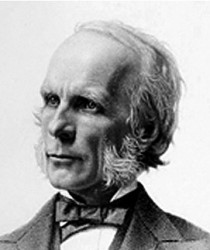
William Greenough Thayer Shedd was born in June of 1820 of a distinguished New England lineage. His father was a minister, though it is not clear whether he was a Congregationalist or a Presbyterian pastor. (In early years, both groups were closely aligned in that region.) When William Shedd was eleven years old in 1831, his family moved to Lake Champlain, New York. This enabled William to later attend the University of Vermont, where a teacher introduced him to philosophy and literature. Graduating in 1839, he began to teach in New York City. It was here that William made a public profession of faith and began to attend a Presbyterian Church.
Sensing the call to the ministry, he attended Andover Theological Seminary. There he met and was influenced by Prof. Leonard Woods, who was a solid Old School Presbyterian. Graduating from Andover, Shedd became a pastor in the Congregational denomination in Vermont.
Even though he was Old School Reformed in his thinking, he taught briefly at the New School Presbyterian institution of Auburn Theological Seminary, from 1852-1854. After the Congregationalists decided to stop emphasizing the distinctive doctrines of the Christian faith, Pastor and Professor Shedd made his switch to the Presbyterian distinctives of his younger years. Leaving Auburn, he was professor of church history at Andover from 1853-1862, and then for two years co-pastor at the Brick Presbyterian Church in New York City.
Shedd’s primary life-work occurred while teaching at Union Theological Seminary in New York City, where he was to teach for eleven years, 1874-1892. Just before the end of his teaching ministry, he wrote his most famous book on Dogmatic Theology. The Trust publishes his Calvinism: Pure and Mixed, and The Doctrine of Endless Punishment.
